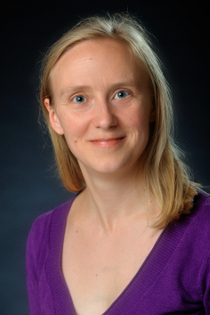Foltz, Anouschka, Assoz. Prof. Dr. phil. M.A. M.A.

Anouschka Foltz is Associate Professor in English Linguistics at the Institute of English Studies at the University of Graz. She joined the institute in July 2018, and she successfully defended her Habilitation entitled "Enablers and barriers in langauge and communication: insights from alignment, processing and acquisition" in 2021. Before coming to Graz she was Lecturer in Psycholinguistics at Bangor University in Wales.
Research interests
Her research is in the area of psycholinguistics, both on adult language processing and L1 and L2 language acquisition. Her main interests revolve around prosodic and syntactic processing. One line of research focuses on syntactic priming in both children and adults. The other line of research deals with contrastive pitch accents in discourse processing. She is also interested in language rights and access to language.
Funded projects
Ongoing:
Wales Public Health Grant
Co-PI on project “Scoping Study: Health and Deafness in Wales Survey”. Funded to the value of £10,000.
Wales School for Social Care Research Capacity Building Small Grant
Co-PI on project “Parenting classes in BSL: Developing culturally-sensitive learning materials”. Funded to the value of £9,979.
Previous:
Welsh Crucible Small Grant
Co-PI on project “Communicating the complexities of climate change”. Funded to the value of £6,200.
Science to public and non-research publications
- Foltz, A. (2020). How we predict upcoming words when we listen to a native and second language. OASIS Summary of Foltz, A. (2020) in Studies in Second Language Acquisition. https://oasis-database.org/concern/summaries/k930bx19j?locale=en
- Foltz, A. (2020). Children represent at least some grammar abstractly before the age of three. Kudos Summary of Foltz, A., Knopf, K., Jonas, K., Jaecks, P., & Stenneken, P. (2020) in First Language. https://www.growkudos.com/publications/10.1177%25252F0142723720905919/reader?utm_source=TrendMD&utm_medium=cpc&utm_campaign=Kudos_TrendMD_0
- Foltz, A. (2020). Clocking your work. Science, 368(6490), 542-542.
- Foltz, A. & Shank, C. (2019). Accessing healthcare is challenging for Deaf people – but the best solution isn’t ‘one-size-fits-all’. The Conversation, November 28. Available at: https://theconversation.com/accessing-healthcare-is-challenging-for-deaf-people-but-the-best-solution-isnt-one-size-fits-all-127734.
- Foltz, A. (2019). Sign languages are fully-fledged, natural languages with their own dialects - they need protecting. The Conversation, January 28. Available at: https://theconversation.com/sign-languages-are-fully-fledged-natural-languages-with-their-own-dialects-they-need-protecting-109388.
- Foltz, A. (2016). On her first birthday, Princess Charlotte already knows much about language. The Conversation, May 2, 2016. http://theconversation.com/on-her-first-birthday-princess-charlotte-already-knows-much-about-language-57005.
- Foltz, A. (2015). When languages die, we lose a part of who we are. The Conversation, December 9, 2015.
- https://theconversation.com/when-languages-die-we-lose-a-part-of-who-we-are-51825.
PhD supervision
Previous PhD candidates:
Alaa Alahmadi: The role of learning strategies in vocabulary acquisition (award year: 2020)
Amirah Saud A. Alharbi: First language attrition and second language acquisition: Exploring the role of phonetic aptitude and langauge use in highly proficient late Arabic-English and English-Arabic bilinguals (award year: 2020)
Jen Lewendon: Two languages, one mind: How accent and lexical stress modulate bilingual language activation (award year: 2020)
Current PhD candidates:
Nika Barišić Ičanović: False friends in the process of second language acquisition – measuring error ratio during English - German and German - English false friend interpretation

